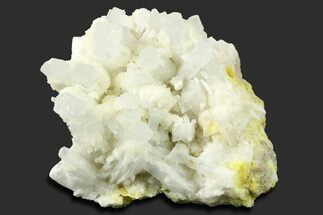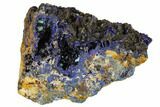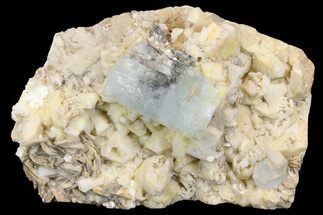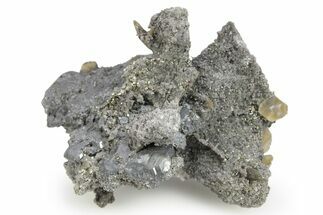This Specimen has been sold.
3.3" Azurite, Aurichalcite and Rosasite Association - Utah
This colorful specimen contains deep blue azurite crystals that formed in association with botryoidal blue-green rosasite and fibrous aurichalcite crystals that branch outward from the rosasite formations. It was collected from the Hidden Treasure Mine in the Ophir District of Utah, a location that's well known for its zinc and copper mineral deposits.
It comes with an acrylic display stand.
It comes with an acrylic display stand.
Rosasite is a secondary mineral that forms in oxidation zones of copper-zinc deposits, generally forming a fibrous botryoidal sphere that can appear vitreous and silky. While typically featuring a blue-green color, colorless specimens are not unheard of. The chemical formula of rosasite is CuZnCO3(OH)2.
Aurichalcite (chemical formula (Zn,Cu)5(CO3)2(OH)6) is a secondary mineral that forms in the oxidation zones of copper and zinc ore deposits. It often forms as radiating, fuzzy-looking acicular blue-green crystals and linings along cavity walls.
About Azurite
Azurite is a copper carbonate hydroxide mineral best known for its beautiful and vibrant blue appearance. Azurite typically forms in nodular formations with other colorful, copper-rich minerals. It is a secondary mineral that precipitated in pores, crevices, and caverns from water with high concentrations of carbon dioxide.
Azurite and malachite are known to form in union with each other since their chemical makeup is very similar. In fact, the presence of more or less water in the location of formation is enough to determine whether an abundance of malachite over azurite, or vise-versa, will accumulate.
Azurite is a copper carbonate hydroxide mineral best known for its beautiful and vibrant blue appearance. Azurite typically forms in nodular formations with other colorful, copper-rich minerals. It is a secondary mineral that precipitated in pores, crevices, and caverns from water with high concentrations of carbon dioxide.
Azurite and malachite are known to form in union with each other since their chemical makeup is very similar. In fact, the presence of more or less water in the location of formation is enough to determine whether an abundance of malachite over azurite, or vise-versa, will accumulate.
SPECIES
Rosasite, Aurichalcite & Azurite
LOCATION
Hidden Treasure Mine, Ophir District, Utah
SIZE
3.3 x 2.6"
CATEGORY
ITEM
#119520
 Reviews
Reviews













